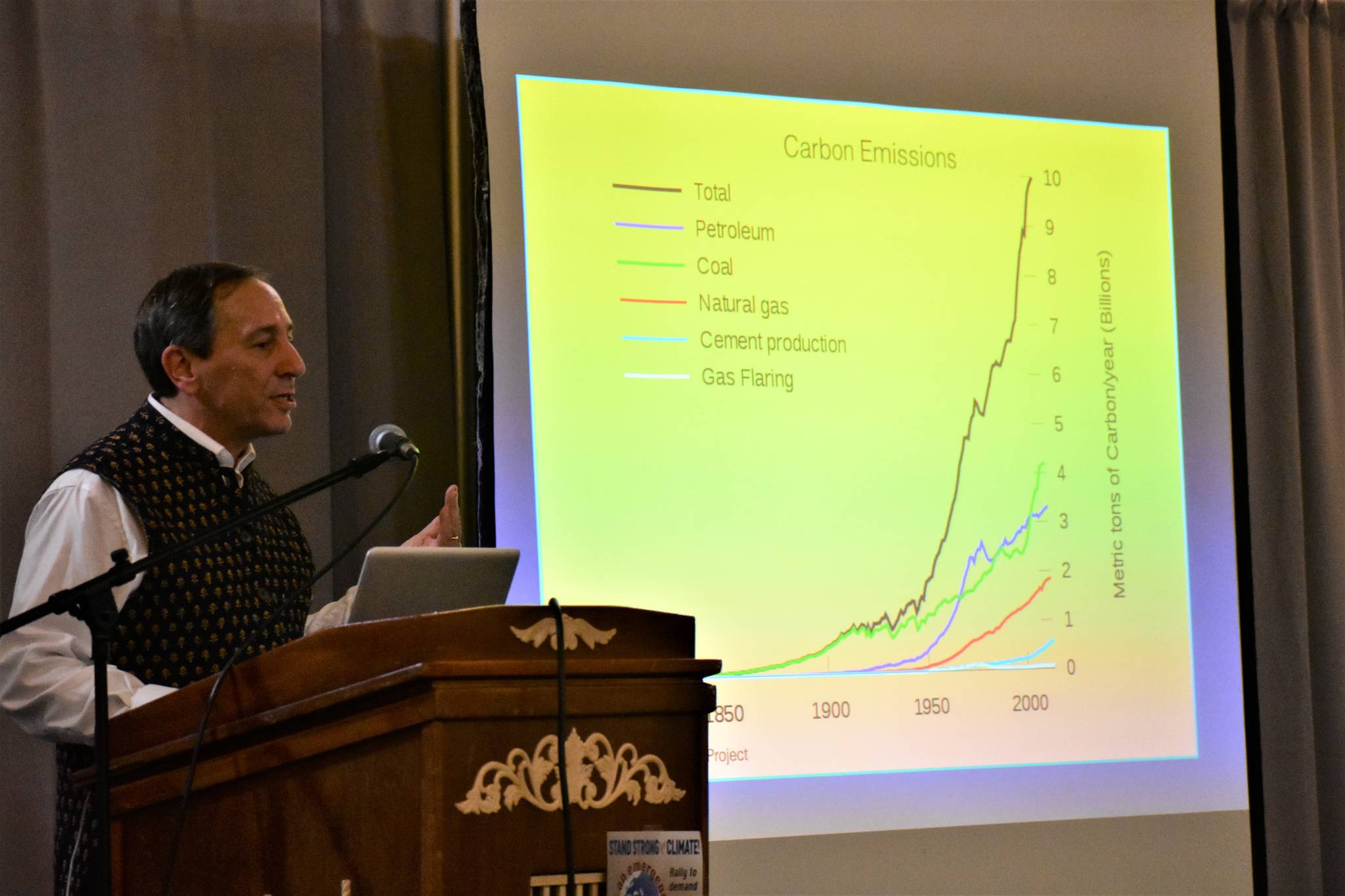Standing next to a graph showing a line running upward at an increasingly steep angle, Dan Grossman asks the crowd, “what’s been the effect of all this?”
His graph showed the explosion of carbon emissions that have taken place since the beginning of the Industrial Revolution in the 18th century. But even though the rise of modern industry raised the amount of carbon in the Earth’s atmosphere, it wasn’t actually until the 1970s that carbon emissions reached their peak.
“Many of the people in the room,” Grossman told the packed crowd at the Juneau Arts and Culture Center, “were alive for the greatest expansion of carbon emissions in human history.”
The crowd, of close to 200, had come to hear Grossman, a prolific climate journalist who’s written for publications around the world, give a lecture on his current project, “In the Heat of the Moment: Reports from the Front Lines of the Climate Crisis.”
Grossman travels the world reporting on the climate, often going into the field with scientists studying the effects of climate change.
His talk focused not just on the amount of carbon being released into the atmosphere, but the projected amounts if current trends persist.
The problem, Grossman said, is that human activity is still degrading natural habitats around the world, which is releasing naturally stored carbon.
“Nature is not just standing by,” he said.
He gave the example of peatlands. Peat is the accumulation of centuries worth of partially decayed organic matter found in wetlands across the globe, including in the Cook Inlet Basin in Alaska. But they’re being destroyed, sometimes by intentional human intervention to make way for farming or some other industry, or by increased temperatures which are drying out the wetlands where peat is found.
When peat is destroyed, it releases the centuries worth of carbon into the atmosphere.
Roadless Rollback? Dunleavy and Trump eye Tongass National Forest.
But Grossman’s talk wasn’t all doom and gloom. He finished his talk by telling locals things they can do to combat what he calls the “climate crisis.” People can easily change their behaviors and have a positive effect on the environment Grossman said. He identified three areas of change for people to focus: behavioral, technological and policy.
Yet, while individuals can take steps to reduce their own carbon footprint, it’s up to governments to take action to implement policy changes.
Bikes are a great example of that, he said. Bicycling, rather than driving a vehicle, reduces carbon emission but people can be hesitant to cycle, particularly in big cities where there’s a fear of traffic. He cited Portland, Oregon as a city that had taken steps to create a bike-friendly environment.
“Portland has amazing bike paths,” he said. “It’s sort of a chicken and egg thing, people who might not think of bicycling today might think of it,” if there were bike friendly infrastructure.
Grossman’s talk happens to coincide with International Forum of Sovereign Wealth Funds taking place in Juneau this week. That forum is being hosted by the Alaska Permanent Fund Corporation (APFC) and will host a number of nations which have sovereign wealth funds, or nationally held accounts similar to the Alaska Permanent Fund. Many of those nations’ funds are bolstered by oil revenue, though some of those nations have made efforts to divest their funds from fossil fuels.
Divestment for the APFC is one of the goals of the organization which invited Grossman, 350 Juneau. “If we’re going to have a viable climate that we can live in, we need to get to renewables and stop burning fossil fuels, it’s really that simple,” said Doug Woodby, co-chair of 350 Juneau.
During the question and answer session, members of the audience asked Grossman what he thought about the efficacy of divestment in combating climate change.
Divestment, Grossman said, was a good place to start.
“Divestment has to do with making oil companies more precarious,” he said, which would in turn make them less attractive for investment and thus less able to continue their operations.
• Contact reporter Peter Segall at 523-2228 or psegall@juneauempire.com.


